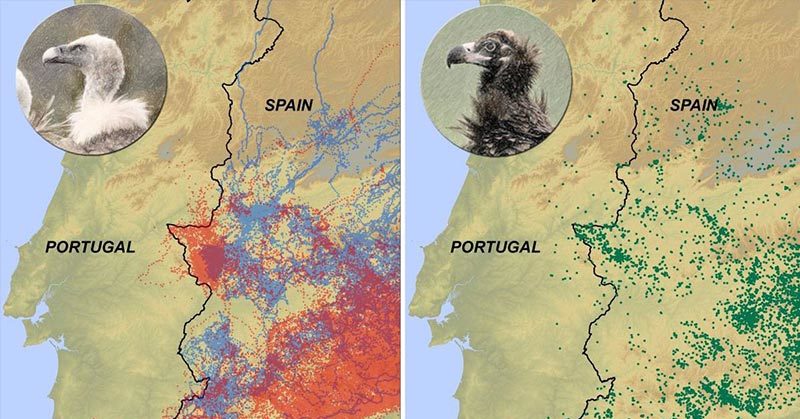When it comes to imaginary borders between countries, humans care a lot. But for animals like vultures, these borders mean nothing. Their movements are driven by instincts, weather, and food availability. However, vultures seem to be avoiding one specific border: Portugal.
These scavenger birds are not avoiding Portugal for political reasons. So what’s the reason behind this behavior? The story of Iberian vultures sheds light on how policy decisions can impact wildlife.
Why Are Vultures Avoiding Portugal?
Spain is home to 90% of Europe’s scavenging birds of prey. Their main food source is carrion, the decaying flesh of dead animals. Vultures can fly hundreds of kilometers a day in search of carrion.
While vultures don’t care about country borders in their quest for food, recent years have seen them avoiding the Portuguese border as if it were a separate country. Researchers found that the availability of carcasses plays a crucial role in this behavior.
Due to an EU mandate in 2001, Spain decided to lift the ban on leaving carcasses out in the open, unlike Portugal where the ban remains. This difference in policies has led to a decline in vultures crossing into Portugal, as there is an abundance of food in Spain but scarcity in Portugal.
Researchers emphasize that the availability of carrion is the primary reason for vultures avoiding Portugal, as there are no significant differences in climate or geography on either side of the border.
Species Pay the Price of Carrion Ban
Eneko Arrondo, a doctoral student at the Doñana Biological Station, and others have worked to change the EU mandate to protect the livelihoods of these carrion birds.
“Thanks to scientific work and the involvement of many managers in Spain, it was found that [European legislation] had a very negative environmental impact. So much data was put on the table that Europe understood,” Arrondo said.
Efforts to change policies have seen progress in Spain, with a Royal Decree allowing the storage of animal carcasses in certain areas. However, Portugal has not made similar changes, leading to a discrepancy in regulations within the Iberian Peninsula that affects threatened species like vultures.
How To Fix the Carrion Shortage
To address the carrion shortage in Portugal, conservation organizations are proposing solutions such as implementing closed areas for carcasses and issuing permits to farmers to leave carrion in authorized fields. These measures not only benefit vultures but also alleviate the financial burden on farmers for carcass collection and disposal.
The situation of Portuguese vultures highlights how political borders can translate into ecological barriers when countries fail to collaborate on wildlife protection policies.
Keep Reading: The Coconut Crab Kills Birds And Breaks Bones – And May Have Eaten Amelia Earhart Alive






